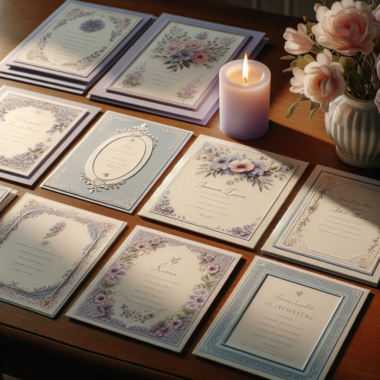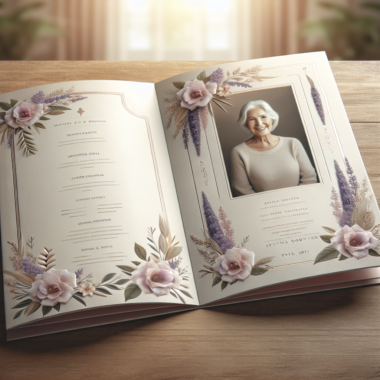Memorial cards are a cherished element of remembrance, offering a tangible connection to those we have lost. These cards typically feature a photograph of the deceased, alongside their name, birth and death dates, and a meaningful message or prayer. They serve as both a tribute and a keepsake, encapsulating the essence of the departed in a compact, portable format.
Traditionally distributed at funerals or memorial services, these cards allow mourners to carry a piece of the memorial with them, fostering an ongoing sense of connection and remembrance. Their compact size makes them ideal for keeping in a wallet or displaying in a special place at home.
Memorial cards can be personalized with various elements to reflect the personality and interests of the loved one. Whether it’s a favorite quote, a beloved poem, or a religious verse, these additions make each card unique and meaningful. In some cultures, memorial cards are also used to announce the death and funeral arrangements, serving a practical as well as emotional function.
In today’s digital age, these cards have also taken on a new form, with many opting to create digital versions that can be shared electronically, ensuring that the memory of their loved one can reach a wider audience. This evolution highlights the enduring relevance of memorial cards as a symbol of remembrance and love.
At DisciplePress, LLC, we specialize in crafting these heartfelt tributes. Order funeral & memorial prints today and ensure a beautiful remembrance for your loved ones.
Purpose of Memorial Cards

The primary purpose of memorial cards is to honor and commemorate the life of a loved one who has passed away. These cards serve as a tangible token of remembrance, allowing family and friends to reflect on cherished memories and the legacy left behind. By encapsulating essential details about the deceased, such as their name, dates of birth and death, and a meaningful message or prayer, memorial cards provide a concise yet poignant tribute.
Beyond their commemorative function, memorial cards also play a practical role during funerals and memorial services. They can guide attendees through the service, offering insight into the life and personality of the deceased. This can be especially comforting for those who may not have known the individual well, providing a deeper understanding and connection.
Another significant purpose of memorial cards is their ability to serve as keepsakes for those mourning the loss. These cards can be carried in a wallet, placed in a photo album, or displayed in a special spot at home, ensuring the memory of the loved one remains close. This ability to hold onto a physical reminder can be a source of comfort and solace during the grieving process.
In addition, memorial cards can also foster a sense of unity among mourners, as they provide a shared symbol of remembrance and respect. By distributing these cards, families offer a piece of the memorial service to each attendee, creating a collective memory that extends beyond the day of the service.
Design Elements of Memorial Cards

Creating a memorial card that truly reflects the essence of a loved one involves thoughtful consideration of various design elements. One of the most critical aspects is the selection of an appropriate image. Often, families choose a cherished photograph that captures the personality or a special moment in the deceased’s life. This image serves as a central visual focus, evoking memories and emotions.
The choice of text is another vital design component. Memorial cards typically include the full name of the deceased, their birth and death dates, and a personalized message. This could be a favorite quote, a religious scripture, or a heartfelt poem that resonated with the individual. The font style and size are carefully selected to ensure readability while adding to the card’s aesthetic appeal.
Color schemes play a significant role in conveying the tone of the memorial card. Soft, muted colors like pastel blues, greens, or creams are often used to create a serene and respectful ambiance. However, some might opt for bolder colors that reflect the vibrant personality or specific preferences of the deceased, making the card unique and personal.
The material and finish of the card are also important considerations. While some may prefer a classic matte finish for a more subdued look, others might choose a glossy finish for a contemporary feel. High-quality paper stock ensures durability, allowing the card to be preserved as a treasured keepsake.
Finally, additional elements such as borders, motifs, or symbols can be incorporated to further personalize the design. These details might include religious symbols, floral patterns, or other graphics that hold special significance. By carefully selecting these design elements, families can create a memorial card that honors their loved one in a deeply personal and meaningful way.
Common Uses for Memorial Cards
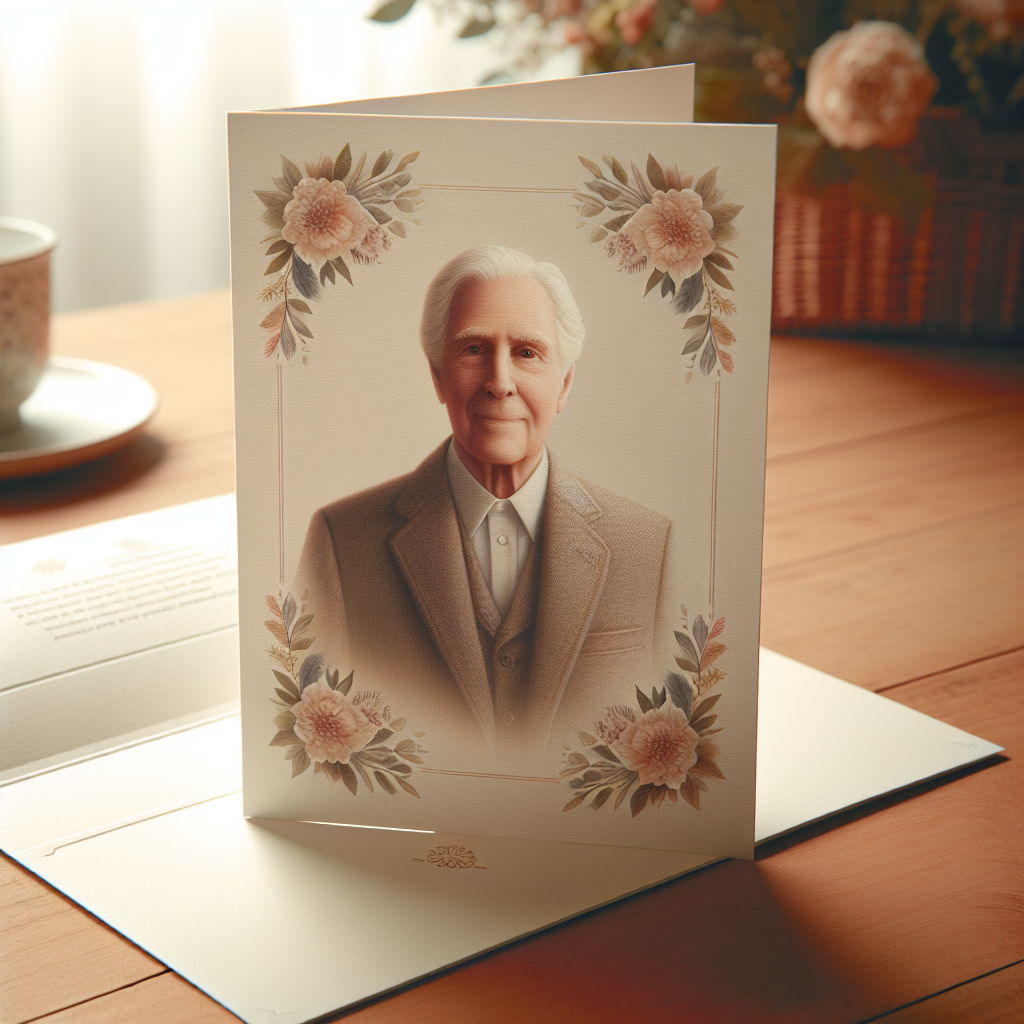
Memorial cards serve a multifaceted purpose in the realm of remembrance and tribute, offering tangible mementos that help keep the memory of a loved one alive. One of the most common uses of these cards is distribution during funeral services or memorial gatherings. Attendees are given these cards as keepsakes, allowing them to carry a piece of the occasion with them. The cards often feature a photograph, significant dates, and a heartfelt message or prayer, making them a cherished reminder of the departed.
Beyond their use at the service, memorial cards can also play a role in personal reflections. Family members and friends may place these cards in personal spaces such as wallets, on refrigerator doors, or in photo albums. This constant presence provides a sense of comfort and a way to remain connected with the loved one, even as time passes.
Additionally, memorial cards can be sent to those who were unable to attend the service. This gesture allows distant relatives and friends to participate in the remembrance process, ensuring they too have a meaningful tribute to hold onto. In this way, memorial cards extend the reach of the memorial service, touching lives across distances.
For those who embrace the digital age, some opt to include QR codes on the cards. These codes can link to online memorial pages or slideshows, merging traditional keepsakes with modern technology. This innovative approach provides a dynamic way to share memories, stories, and condolences, broadening the scope of how we honor and remember our loved ones.
In essence, memorial cards are versatile tools that help foster a lasting connection with those we have lost. Their significance lies not only in their immediate use during services but also in their enduring presence in the lives of those left behind.
Creating Personalized Memorial Cards
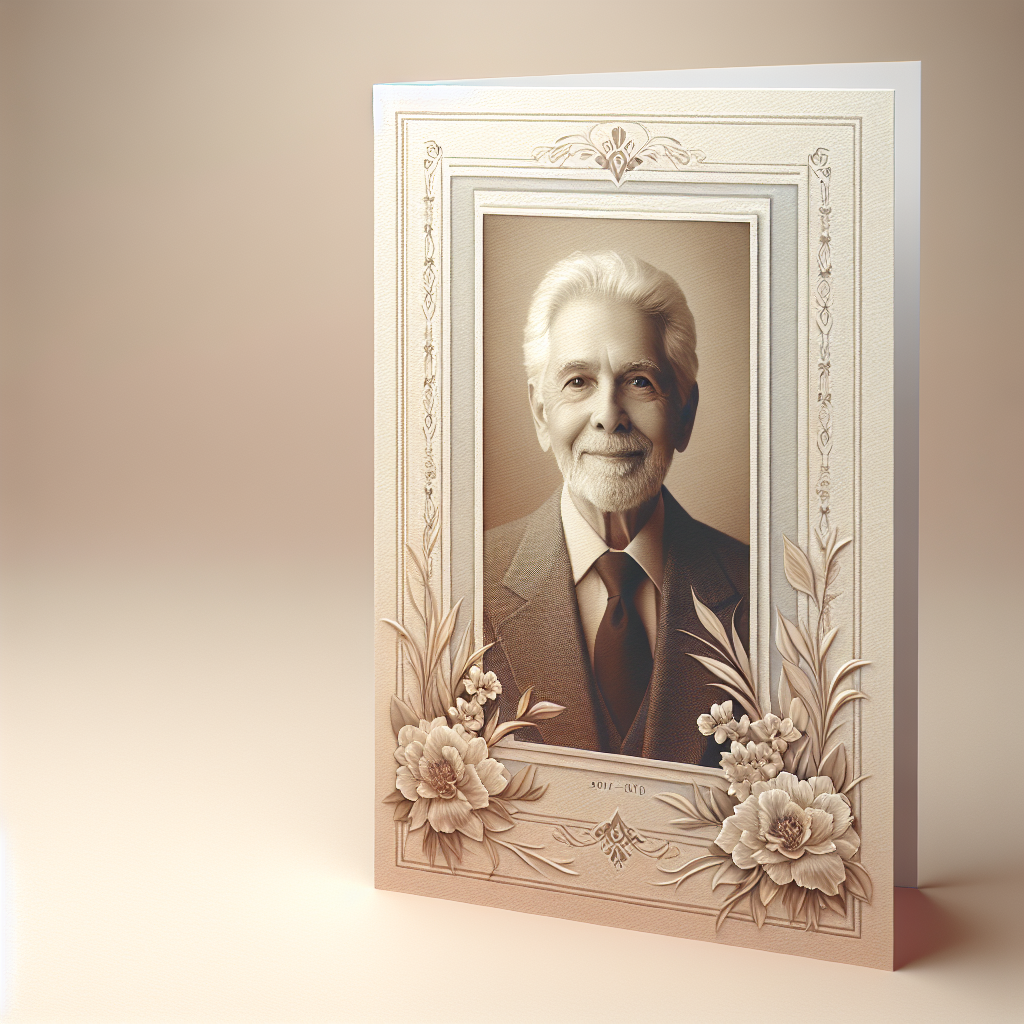
The process of creating personalized memorial cards is a delicate task that offers an opportunity to uniquely honor a loved one’s life. These cards are more than just printed materials; they are heartfelt tributes that capture the essence of the individual being remembered. Personalization allows family members and friends to infuse the cards with personal touches that resonate with the deceased’s personality and legacy.
To begin the creation process, consider incorporating a favorite photograph of the departed. This image serves as the focal point of the card, bringing a sense of familiarity and warmth to those who receive it. Accompanying the photo, a selection of meaningful quotes, poems, or scriptures can be included. These words should reflect the character, beliefs, or sentiments that the deceased held dear, offering solace and reflection for those who read them.
Another layer of personalization can be achieved through the design elements. Choosing a color palette or theme that was significant to the person’s life can add a unique touch. Whether it’s a favorite color, a beloved hobby, or a particular passion, these elements help to craft a narrative that is both intimate and memorable.
Many families also choose to add personal anecdotes or short biographies. These snippets of life stories give recipients a deeper understanding of the individual’s journey, celebrating achievements and cherished moments. This storytelling aspect transforms the memorial card into a written testament of a life well-lived.
Finally, the size and shape of the card can also be customized to suit personal preferences, ranging from traditional rectangular cards to more modern and innovative designs. By tailoring each aspect of the card, families ensure that the memory of their loved one is preserved in a way that is both meaningful and respectful.
Choosing the Right Printing Service
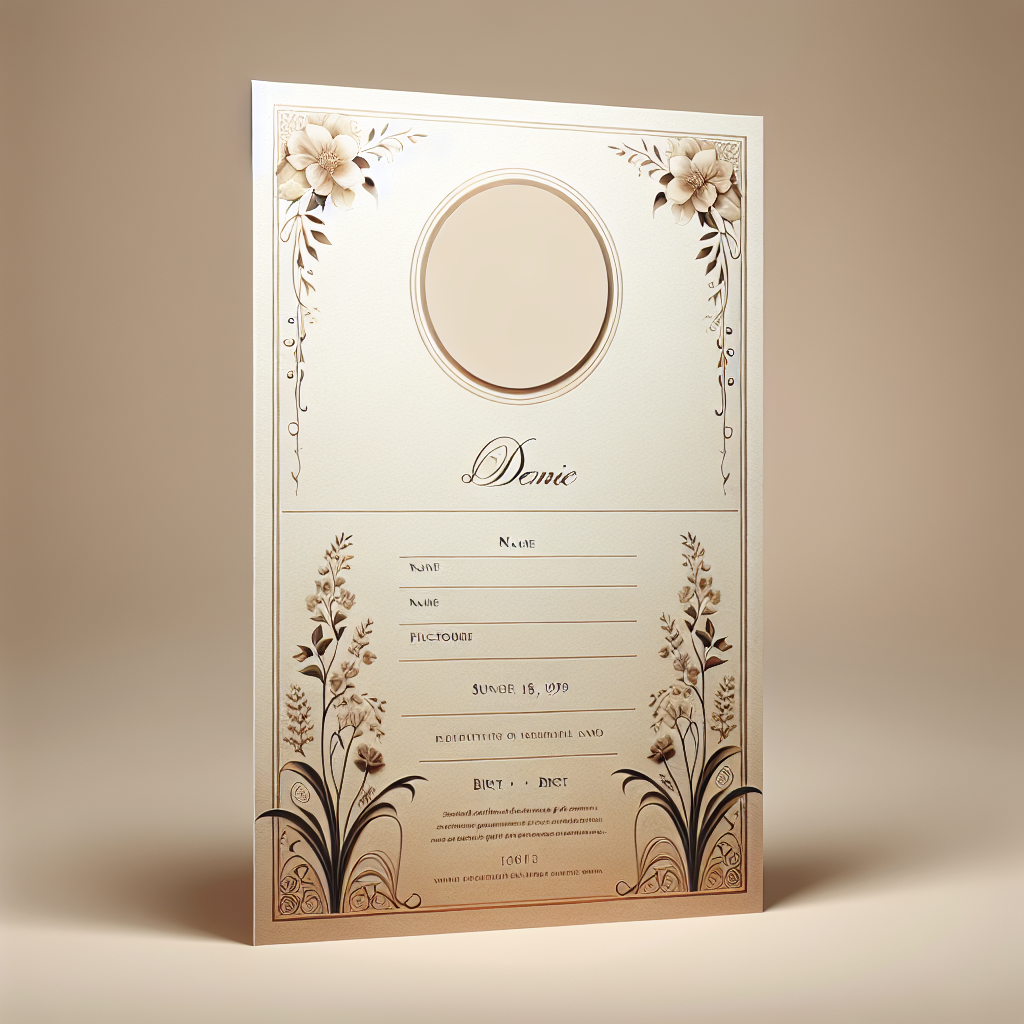
When it comes to selecting the right printing service for your memorial cards, there are several factors to consider to ensure that your tribute is both beautiful and professionally crafted. A reliable printing service can make a significant difference in the quality and presentation of the cards, which will be cherished keepsakes for many attendees.
First, evaluate the range of options offered by the service. This includes materials, finishes, and design templates. A wide selection allows you to tailor the cards to your specific needs and preferences, ensuring that they reflect the unique personality of your loved one. Look for services that offer high-quality paper and printing techniques, as these will enhance the durability and aesthetic appeal of the cards.
Customer support is another crucial aspect to consider. A compassionate and responsive service team can guide you through the process, offering advice and helping to bring your vision to life. Whether you need assistance with design elements or technical specifications, an attentive support team can alleviate stress during this emotional time.
Additionally, consider the turnaround time and shipping options. In many cases, memorial cards are needed quickly, so finding a service that can deliver promptly without compromising quality is essential. Look for reviews or testimonials from previous customers to gauge the service’s reliability and efficiency.
Finally, pricing is an important factor, but it should be balanced with quality. While it might be tempting to choose the cheapest option, remember that these cards are a lasting tribute to your loved one. Investing in a quality service ensures that the memorial cards are respectful and fitting.
By carefully selecting a printing service that meets these criteria, you can create a touching and meaningful tribute. Order funeral & memorial prints today to ensure a high-quality memorial card that honors the memory of your loved one. Visit DisciplePress, LLC to explore your options.
 Free Shipping Over $50
Free Shipping Over $50  888-432-8363
888-432-8363


 Obituary/Programs
Obituary/Programs No-Fold Memorial Programs
No-Fold Memorial Programs 4 Page Funeral Programs
4 Page Funeral Programs 8 Page Memorial Programs
8 Page Memorial Programs 12 Page Funeral Programs
12 Page Funeral Programs 16 Page Funeral Programs
16 Page Funeral Programs 20 Page Funeral Programs
20 Page Funeral Programs Tri-Fold Funeral Programs
Tri-Fold Funeral Programs Complete Memorial Packages
Complete Memorial Packages
 Cards & Bookmarks
Cards & Bookmarks Saint Prayer Cards
Saint Prayer Cards Folded Memorial Cards
Folded Memorial Cards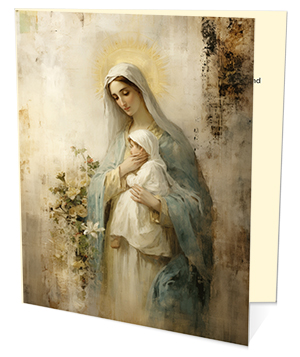 Folded Holy Cards
Folded Holy Cards Memorial Bookmarks
Memorial Bookmarks Thank You Cards
Thank You Cards Share-A-Memory Cards
Share-A-Memory Cards Memorial Magnets
Memorial Magnets
 Memorial Posters
Memorial Posters Guest Books
Guest Books Slide Shows
Slide Shows Memorial Fans
Memorial Fans Death Announcements
Death Announcements Take Away Keepsakes
Take Away Keepsakes
 Church Products
Church Products


